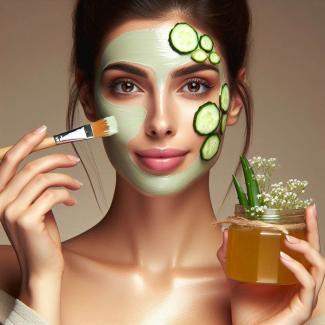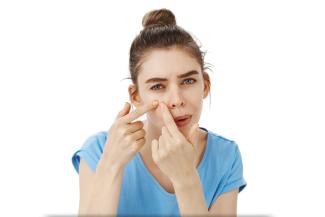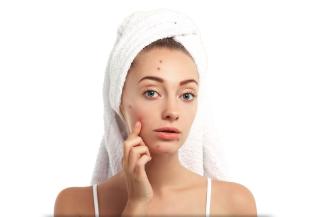
Maintaining healthy skin is not just about achieving a radiant complexion but also about ensuring that your skin functions optimally. Skin health is an essential component of overall well-being, influencing not only how we look but also how we feel. Here’s a detailed guide to help you keep your skin in the best condition possible.
1. Understanding Skin Types
- Normal Skin: Balanced in terms of moisture and oil production. It’s neither too oily nor too dry.
- Oily Skin: Characterized by excess sebum production, which can lead to a shiny appearance and potential acne.
- Dry Skin: Often feels tight or rough and may show signs of flakiness or scaling.
- Combination Skin: A mix of oily and dry areas, typically with an oily T-zone (forehead, nose, chin) and drier cheeks.
- Sensitive Skin: Prone to redness, irritation, and reactions to products or environmental factors.
2. Establishing a Skincare Routine
- Cleansing: Use a gentle cleanser suited to your skin type. Cleansing twice daily—morning and night—helps remove impurities and excess oils.
- Exfoliating: Exfoliate 1-2 times per week to slough off dead skin cells. Choose between physical exfoliants (scrubs) and chemical exfoliants (acids like AHAs or BHAs).
- Moisturizing: Apply a moisturizer daily to lock in hydration. Opt for lightweight, non-comedogenic formulas if you have oily skin, and richer creams if your skin is dry.
- Sun Protection: Daily application of sunscreen with SPF 30 or higher is crucial. Sunscreen protects against UV radiation that can cause premature aging and skin cancer.
3. Lifestyle Factors
- Diet: A balanced diet rich in antioxidants, vitamins, and minerals supports skin health. Include fruits, vegetables, lean proteins, and healthy fats.
- Hydration: Drinking sufficient water helps maintain skin elasticity and moisture levels.
- Sleep: Aim for 7-9 hours of quality sleep each night to allow your skin to repair and regenerate.
- Stress Management: High stress levels can exacerbate skin conditions. Engage in activities like yoga, meditation, or hobbies to manage stress effectively.
4. Skin Treatments and Procedures
- Facials: Regular facials can provide deep cleansing, exfoliation, and hydration.
- Serums: Incorporate serums with active ingredients like vitamin C, hyaluronic acid, or retinol to target specific concerns such as aging or pigmentation.
- Professional Treatments: Consider dermatological treatments like chemical peels, laser therapy, or microneedling for more significant skin concerns.
5. Avoiding Common Mistakes
- Overusing Products: More is not always better. Using too many products or overly aggressive treatments can irritate the skin.
- Ignoring Ingredients: Pay attention to ingredient lists. Avoid products with alcohol or harsh chemicals that can strip the skin’s natural oils.
6. Seasonal Adjustments
- Winter: Use richer moisturizers and consider using a humidifier to combat dry indoor air.
- Summer: Opt for lighter, oil-free products and ensure regular reapplication of sunscreen.
How Diet Affects Your Skin's Health: What to Eat for Glowing Skin
The saying "you are what you eat" holds significant truth when it comes to your skin’s health. The nutrients you consume directly impact your skin’s appearance and functionality. Here’s a guide to understanding how diet influences your skin and what to include in your meals for a glowing complexion.
1. Essential Nutrients for Healthy Skin
- Vitamin C: Promotes collagen production, which helps in maintaining skin elasticity. Found in citrus fruits, strawberries, and bell peppers.
- Vitamin E: Acts as an antioxidant that protects skin cells from damage. Sources include nuts, seeds, and green leafy vegetables.
- Vitamin A: Supports skin cell production and repair. Carrots, sweet potatoes, and leafy greens are excellent sources.
- Omega-3 Fatty Acids: Help to maintain skin hydration and reduce inflammation. Found in fatty fish (like salmon), flaxseeds, and walnuts.
2. Foods to Include
- Fruits and Vegetables: Rich in antioxidants and vitamins that combat free radicals and promote skin health.
- Whole Grains: Provide essential nutrients and fiber, which help maintain stable blood sugar levels and prevent inflammation.
- Lean Proteins: Vital for collagen production and repair. Opt for chicken, fish, and plant-based proteins like legumes and tofu.
- Nuts and Seeds: Excellent sources of healthy fats and vitamins. Almonds, chia seeds, and sunflower seeds can boost skin health.
3. Foods to Avoid
- Sugary Foods: Excess sugar can lead to glycation, which damages collagen and elastin fibers in the skin.
- Processed Foods: High in unhealthy fats and additives that can contribute to inflammation and breakouts.
- Excessive Salt: Can cause dehydration and lead to puffiness and water retention.
4. Hydration
- Water: Essential for maintaining skin hydration and flushing out toxins.
- Herbal Teas: Offer additional hydration and antioxidants. Green tea is particularly beneficial due to its high content of catechins.
5. Balanced Meals
- Breakfast: Include fruits, whole grains, and proteins like eggs or yogurt.
- Lunch: Opt for a salad with a variety of colorful vegetables, lean proteins, and a healthy fat source like avocado.
- Dinner: Focus on a balanced plate with vegetables, whole grains, and a portion of fish or poultry.
Best Skin Care Habits: How to Maintain a Young and Healthy Look
Achieving and maintaining youthful and healthy skin requires consistent and mindful skincare practices. Here’s a guide to the best habits that can help you preserve your skin’s vitality and youthful appearance.
1. Daily Cleansing
- Morning and Night: Cleanse your skin twice daily to remove dirt, oil, and makeup. This helps prevent clogged pores and breakouts.
2. Regular Exfoliation
- Frequency: Exfoliate 1-2 times per week to remove dead skin cells and encourage cell turnover. Choose products suited to your skin type to avoid over-exfoliation.
3. Consistent Moisturizing
- Daily Application: Use a moisturizer appropriate for your skin type to maintain hydration and support the skin’s barrier function.
4. Sun Protection
- Daily SPF: Apply sunscreen with at least SPF 30 every day, even on cloudy days or indoors. Reapply every two hours when exposed to direct sunlight.
5. Incorporating Anti-Aging Products
- Retinoids: Promote cell turnover and collagen production, helping to reduce the appearance of fine lines and wrinkles.
- Antioxidants: Serums with vitamin C or E can protect the skin from environmental damage and brighten the complexion.
6. Healthy Lifestyle Choices
- Balanced Diet: As mentioned earlier, a diet rich in nutrients supports skin health.
- Regular Exercise: Enhances blood circulation, which helps deliver nutrients to the skin and promotes a healthy glow.
7. Adequate Sleep
- Restorative Sleep: Ensure you get 7-9 hours of sleep per night. During sleep, the body repairs and regenerates skin cells.
8. Avoid Smoking and Limit Alcohol
- Smoking: Contributes to premature aging and wrinkles by decreasing blood flow to the skin.
- Alcohol: Can dehydrate the skin and contribute to inflammation.
9. Stress Management
- Relaxation Techniques: Practice stress-relief methods such as meditation or deep breathing exercises to maintain skin health.
10. Regular Dermatological Check-Ups
- Professional Advice: Regular visits to a dermatologist can help monitor skin health and address any concerns before they become serious issues.
Discover the Secrets of Sun Protection: How to Prevent Skin Damage from UV Rays
Sun protection is vital to prevent skin damage, premature aging, and skin cancer. Here’s how you can effectively protect your skin from harmful UV rays:
1. Use Sunscreen
- SPF: Choose a broad-spectrum sunscreen with an SPF of 30 or higher. Apply it generously and evenly to all exposed skin.
- Reapplication: Reapply every two hours, or more frequently if swimming or sweating.
2. Wear Protective Clothing
- Clothing: Opt for long-sleeved shirts, long pants, and wide-brimmed hats. Clothing made with UV-blocking fabric provides additional protection.
- Sunglasses: Use sunglasses with UV protection to shield your eyes and the delicate skin around them.
3. Seek Shade
- Avoid Peak Sun Hours: Stay in the shade, especially between 10 a.m. and 4 p.m., when UV rays are strongest.
4. Be Cautious with Reflective Surfaces
- Reflection: UV rays can reflect off surfaces like water, sand, and snow, increasing your exposure. Take extra precautions in these environments.
5. Regular Skin Checks
- Self-Exams: Regularly check your skin for any new or changing moles or spots. Early detection of skin changes can be crucial for successful treatment.
Why Hydration is Key to Skin Health: How to Drink Enough Water
Proper hydration is essential for maintaining healthy skin. Here’s why it’s important and how to ensure you’re drinking enough water:
1. Benefits of Hydration
- Skin Elasticity: Adequate hydration helps maintain skin’s elasticity and suppleness.
- Prevents Dryness: Proper fluid intake helps prevent dry and flaky skin.
- Reduces Wrinkles: Well-hydrated skin appears smoother and less prone to fine lines.
2. How Much Water to Drink
- General Guidelines: Aim for about 8 glasses (2 liters) of water daily. Individual needs may vary based on factors like activity level and climate.
3. Hydrating Foods
- High-Water Content Foods: Include foods like cucumbers, melons, and oranges in your diet. These can contribute to your overall hydration.
4. Monitoring Hydration
- Urine Color: A light yellow color typically indicates good hydration. Darker urine may suggest a need for more fluids.
5. Hydration Strategies
- Regular Consumption: Drink water throughout the day rather than consuming large amounts at once.
- Infused Water: If plain water is unappealing, try infusing it with fruits or herbs for added flavor.
6. Adjustments for Activity
- Exercise: Increase your water intake before, during, and after exercise to compensate for fluid loss through sweat.
Effective Methods to Manage Stress and Maintain Healthy Skin
Stress can significantly impact skin health, leading to various skin issues. Here’s how to manage stress effectively and its impact on your skin:
1. Stress and Skin Connection
- Breakouts: Stress can trigger or worsen acne due to increased cortisol levels.
- Inflammation: Stress can exacerbate inflammatory skin conditions like eczema and psoriasis.
2. Stress Management Techniques
- Meditation: Practice mindfulness or guided meditation to reduce stress and promote relaxation.
- Exercise: Engage in regular physical activity to release endorphins, which can improve mood and reduce stress.
3. Healthy Coping Mechanisms
- Hobbies: Spend time on activities you enjoy, such as reading, gardening, or painting, to help unwind.
- Social Support: Connect with friends and family for emotional support and stress relief.
4. Balanced Lifestyle
- Nutrition: Eat a balanced diet to support overall well-being and help manage stress levels.
- Sleep: Ensure you get adequate, quality sleep to help your body and mind recover from stress.
5. Professional Help
- Therapy: Consider speaking with a mental health professional if stress becomes overwhelming. Therapy can provide tools and strategies for effective stress management.
Cosmetics and Skin Health: How to Choose the Right Products for Your Skin Type
Selecting the right cosmetic products is crucial for maintaining skin health. Here’s how to choose products that suit your skin type:
1. Identify Your Skin Type
- Assessment: Determine whether your skin is oily, dry, combination, or sensitive to tailor your product choices accordingly.
2. Ingredients to Look For
- Hyaluronic Acid: Provides hydration by attracting moisture to the skin.
- Niacinamide: Known for its soothing properties and ability to improve skin texture and tone.
- Salicylic Acid: Effective for treating acne-prone skin by exfoliating and unclogging pores.
3. Avoid Harsh Ingredients
- Alcohol: Can be drying and irritating, especially for sensitive skin.
- Fragrance: Fragrance-free products are less likely to cause irritation or allergic reactions.
4. Patch Testing
- Test Products: Perform a patch test before using new products to ensure they don’t cause an adverse reaction.
5. Consult with a Dermatologist
- Professional Advice: For personalized recommendations, consult with a dermatologist who can suggest products based on your specific skin needs.
Environmental Impact on Skin Health: How to Protect Yourself from Pollution and Adverse Weather Conditions
Environmental factors can affect skin health, leading to issues such as premature aging and irritation. Here’s how to protect your skin from environmental damage:
1. Pollution Protection
- Cleansing: Use a gentle cleanser to remove pollutants and toxins from your skin daily.
- Antioxidants: Incorporate antioxidants into your skincare routine to help neutralize free radicals caused by pollution.
2. Weather Protection
- Cold Weather: Protect your skin from harsh winds and cold by using moisturizers and wearing protective clothing.
- Hot Weather: Use lightweight, non-comedogenic products to prevent clogging pores and causing breakouts.
3. Humidity
- High Humidity: Choose oil-free products to prevent excess shine and breakouts in humid conditions.
- Low Humidity: Use a humidifier indoors to maintain moisture levels and prevent dryness.
4. Travel Tips
- Airplane Travel: Airplane cabins can be very dry. Use hydrating mists and moisturizers to keep your skin hydrated during flights.
The Most Common Skin Problems and How to Prevent Them: Tips from Dermatologists
Understanding common skin problems and how to prevent them can help maintain clear and healthy skin. Here’s a guide to some of the most frequent skin issues and their prevention:
1. Acne
- Prevention: Maintain a regular cleansing routine, avoid touching your face, and use non-comedogenic products.
2. Eczema
- Prevention: Keep skin moisturized, avoid known irritants, and use gentle, fragrance-free skincare products.
3. Psoriasis
- Prevention: Manage stress, avoid triggers like certain medications or infections, and use prescribed treatments as directed.
4. Rosacea
- Prevention: Identify and avoid triggers such as hot beverages or spicy foods. Use gentle skincare products and sun protection.
5. Hyperpigmentation
- Prevention: Use sunscreen regularly, avoid excessive sun exposure, and consider products with ingredients like vitamin C or niacinamide to reduce pigmentation.
6. Wrinkles
- Prevention: Maintain a good skincare routine, use anti-aging products, and protect your skin from sun exposure.
7. Dry Skin
- Prevention: Use moisturizers daily, avoid long hot showers, and stay hydrated.
When is it Time to See a Dermatologist: Symptoms You Shouldn't Ignore
Knowing when to seek professional help is crucial for addressing skin concerns effectively. Here are symptoms that warrant a visit to a dermatologist:
1. Persistent or Severe Acne
- Professional Treatment: If over-the-counter treatments aren’t effective, a dermatologist can offer prescription medications or therapies.
2. Unusual Skin Changes
- Monitoring: Changes in moles or skin lesions, such as growths or bleeding, should be evaluated to rule out skin cancer.
3. Chronic Skin Conditions
- Consultation: For ongoing issues like eczema or psoriasis that don’t improve with standard treatments, seek specialized care.
4. Persistent Itching or Rash
- Diagnosis: Persistent itching or rashes may require a dermatologist’s expertise to identify the cause and appropriate treatment.
5. Severe Skin Infections
- Medical Attention: Infections that don’t improve with over-the-counter remedies or are accompanied by significant pain or swelling should be assessed by a professional.
6. Autoimmune Skin Disorders
- Specialist Care: Conditions such as lupus or dermatomyositis require specialized treatment and monitoring.
7. Cosmetic Concerns
- Consultation: If considering cosmetic procedures or treatments, consult a dermatologist for expert advice and recommendations.
This comprehensive guide covers essential aspects of maintaining healthy skin, from daily routines and diet to sun protection and stress management. By following these tips and seeking professional advice when necessary, you can achieve and sustain a vibrant, healthy complexion.






